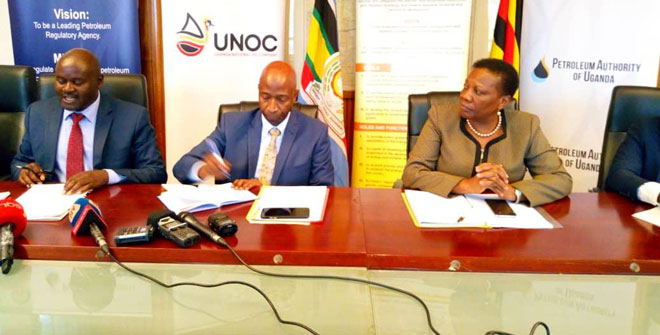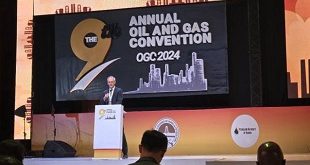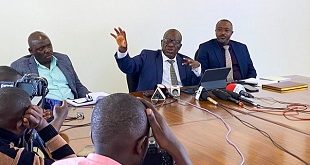
Kampala, Uganda | THE INDEPENDENT | Cabinet last week made a decision for Uganda to join the Extractive Industries Transparency Initiative-(EITI). Government Spokesperson, Ofwono Opondo said cabinet agreed to join the initiative as part government’s commitment to accountability and transparency in the oil and gas sector.
Ofwono’s revelation drew minimal media attention yet there had been pressure from some government officials, Civil Society, Members of Parliament and donors urging government to subscribe to EITI. Some have been skeptical about government’s commitment to accountability and transparency including making oil deals public.
Petroleum Authority Executive Director, Dr. Earnest Rubondo, says they are bound by the EITI requirements, which had been envisaged in the oil and gas Policy 2008.
It is not clear whether government will follow the EITI requirements in the mineral sector. But for the oil and gas sector, Dr. Rubondo, said it will not be hard for the Petroleum Authority to ensure accountability and Transparency as per the EITI requirements.
The Auditor General’s Office has been one of the government accounting bodies pushing for Uganda’s membership to EITI. Keto Nyapendi, the Assistant Auditor General has in the past talked about the benefits of joining.
The cabinet decision to join the Extractive Industries Transparency Initiative has also been lauded by a section of civil society in the oil and gas sector.
Winnie Ngabirwe, the coordinator of Publish What You Pay (PYP) Uganda, says the move is welcome because it opens the oil and gas sector in Uganda to citizen scrutiny. She says dealing in the oil and gas sector will no longer remain secretive as they have been in the past.
Ngabirwe, whose organization has been championing the campaign for Uganda to Join EITI, said the same principals should be extended to the mineral sector.
She stressed that the role of the EITI in Uganda, like in other implementing countries, is to collect data from government and companies on their performance in the extractive sector so that citizens can understand how their resources are being allocated, the revenues they are bringing in and how they are being distributed.
Sources indicate that Ministry of Finance has already embarked on the process of notifying the EITI board in Oslo Norway about the country’s decision to sign up to the EITI as one of the member countries.
Uganda has equally been under pressure from the European Union to sign up to the EITI as per the EU Accounting and Transparency Directives.
The European Union Parliament in 2013 adopted new mandatory reporting standards for extractive companies leading to the enactment of the revised EU Accounting and Transparency Directives. The EU directives require extractive companies to disclose annually the payments they make to governments for access to natural resources in every country they invest in, and for every individual project they operate.
EU companies in the Extractive’s sector have been finding difficulty investing in Uganda’s oil, gas and mineral’s sector because Uganda had not subscribed to EITI. The Head of EU delegation in Uganda, Attilio Pacifici had in December last year expressed concern that Uganda had failed to fulfill it condition on EITI.
EU had withheld the release of first tranche of a total of €66 million ($75 million) is to the Justice, Law and Order sector pending a written statement about the intention to join the Extractive Industries Transparency Initiative (EITI). EU Head of Delegation, Attilio Pacifici was one of the Diplomats that hailed the government decision in a statement issued on 28th January.
“The EITI is the global standard to promote the open and accountable management of oil, gas and mineral resources, and Uganda’s decision to become a fully-fledged member state is an important step for improved accountability particularly as the country continues to prepare for oil production,” read the statement.
Pacifici confirmed that through persistent policy dialogue, the EU and its member’s states, as well as other leading development partners, have encouraged Uganda’s formal accession to the EITI to address vital governance issues of the oil, gas and mining sectors, including transparency and accountability.
What Is EITI?
In 2003 a coalition of activists from NGOs, governments led by the United Kingdom and a group of energy and mining companies agreed to a set of principles which became known as the Extractive Industry Transparency Initiative (EITI). The EITI now has 46 participant nations from the West and well as Africa.
The initiative is an example of international standard setting, or soft law aimed at avoiding the resource course in mineral rich countries that have remained poorer and corrupt due to lack of transparency and accountability. The EITI Standard requires disclosure of information along the extractive industry value chain, from how extraction rights are awarded, to how revenues make their way through the government, and how they benefit the public.
 The Independent Uganda: You get the Truth we Pay the Price
The Independent Uganda: You get the Truth we Pay the Price


